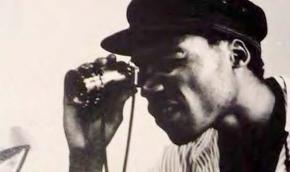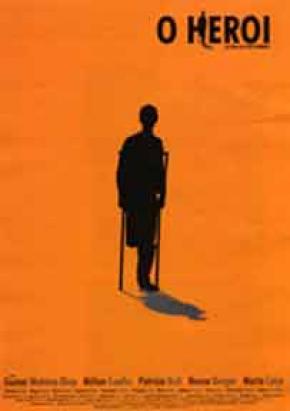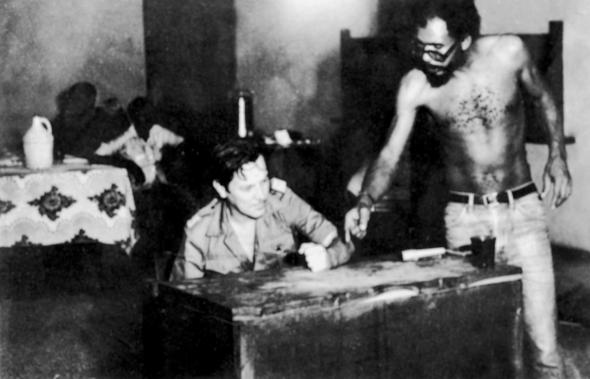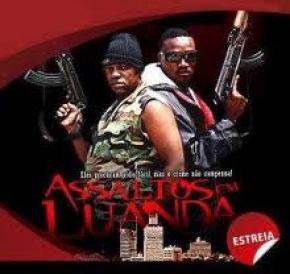Angola film industry at a glance
Angola is a leading oil producer in Africa and one might have expected that some of the financial benefits of this valuable commodity would be passed onto the country’s film industry. Veteran Angolan filmmaker Mariano Bartolomeu provides an insight into the state of the film and television industry in this Portuguese speaking country.
 Mariano BartolomeuIn the opinion of filmmaker Mariano Bartolomeu, who has been involved in the film and television industry for many years, the Angolan film industry at present is almost non-existent. He emphasises, however, that there is a wave of young filmmakers who are making video features in the Nollywood style.
Mariano BartolomeuIn the opinion of filmmaker Mariano Bartolomeu, who has been involved in the film and television industry for many years, the Angolan film industry at present is almost non-existent. He emphasises, however, that there is a wave of young filmmakers who are making video features in the Nollywood style.
Angolan filmmakers are very enthusiastic about what they are doing and good at marketing their products, says Bartolomeu. He describes the films made by his colleagues as “very cheap and technically very faulty but they are very successful with Angolan audiences who respond to the stories because they identify with them”.
Most of these films tell stories of poor people struggling to make a living or criminality and gangster lifestyles in the country. “I talked to one of the directors of these films Henrique ‘Dito’ Narciso, who is the most prominent among our filmmakers with hit titles like Assaltos in Luanda 1 and 2. He told me that he usually makes a profit from his films.”
 'o herói', de zézé gamboaBartolomeu and other veteran filmmakers are concerned that the authorities will not fund future films as they are given the impression that films can be made without any state funding.
'o herói', de zézé gamboaBartolomeu and other veteran filmmakers are concerned that the authorities will not fund future films as they are given the impression that films can be made without any state funding.
The government has funded a number of films in the last few years, with three features made within a year: A Cidade Vazia (The Hallow City) by Maria Joao Ganga, O Heroi (The Hero) by Zeze Gamboa and Comboio da Canhoca (Train to Canhoca) by Orlando Fortunato. After these were made in the middle of this decade, there was widespread hope that the Angolan film industry would take off. They were all well received locally and won prizes at international film festivals. The Hero won best feature in the category of world competition at the Sundance Film Festival in 2006/2007.
Unfortunately there was no follow up government funding for more films in subsequent years.
 orlando fortunato
orlando fortunato
Distinguished career
Bartolomeu has been in the film industry more than 20 years. He started when he was 15 years old working at the Angolan film archives. He has worked as an assistant director for educational film programmes on television and radio. He wrote his first screenplay at 16, which was shot as a telefilm in the only TV station in Angola at the time. It was an adaptation of a play by a German writer Fred Wedkind. “I didn’t like the result and it was probably the main reason I decided to become a director myself. Before that I used to think of myself as a feature writer. I loved literature and American writers like Hemingway and JD Salinger. I wanted to write like them.” He then attended the International Film School of San Antonio de Los Banos in Cuba, where he graduated as film director after three and half years of training. He describes this as “a great experience”.
“We had important filmmakers from all over the world that went there sometimes to teach, people like Jean Claude Carrier, Francis Ford Coppola, Walter Murch and George Lucas. I made several short films there and two of them Un Lugar Limpio y Bien Iluminado (A Well Light and Clean Place) and Who Makes Quin Run? were screened at various film festivals around the world in the nineties.”
Bartolomeu then lived in Italy for about five years where he had gone to work as scriptwriter for a feature film with an Italian producer. Unfortunately it was never made due to lack of funding. Years later he co-wrote and co-starred in a feature film called Bell’Amico (2003) by Italian director Luca D’Ascanio. The film won best feature comedy in the Monte Carlo Film Festival. He played himself in that film. Later he was granted a Fulbright Scholarship in the US where he did a masters degree in filmmaking.
Among the recent productions by the Angolan filmmaker are The Plane (USA, 2001) 16mm, black and white; The Storyteller ( Angola/USA, 2003) video fiction; O Comba (After the Funeral) (Angola, 2007) a 10-episode TV mini-series produced for the Angolan Public Television; Uma Noite Perfeita Para Falar de Amor (A Perfect Night To Talk About Love) (Angola, 2008). He also created Ecos & Factos, the longest running and most viewed television programme on local public television.
Bartolomeu feels he learns a lot about human nature when he makes documentaries. With fiction, he tries to project his hopes and fantasies and give shape to his own perception of life and things around him.
“My next challenge is to produce a feature film in the next couple of years. My projects include a road movie story “My next challenge around Angola’s countryside and an adaptation of I Wish I Were a Sea Wave by Angolan writer Manuel Rui.”
Challenges
The challenges all Angolan filmmakers face are mainly financial. “There is little or almost no money available for funding films. We still lack a law for film policy or funding policy. Although the Angolan state was very active after independence, financing and promoting the film industry (there were lots of film documentaries produced at the time), it has became completely absent since the early nineties when it started funding public television on a massive scale. The other main challenge is the lack of good technicians and professionals. I experienced it when I shot my miniseries: I had to take care of the art direction myself.”
He is worried by the film training situation in Angola. “There are no film schools. From time to time there are specific workshops but this is not enough to provide requisite skills to people and build a film industry. The government is building an art academy which will include film and TV courses. But it will be of a middle level education. We still need to introduce film courses at university level.”
 'Assaltos em Luanda'Despite the lack of education, the Angolan film sector enjoys “very good facilities for TV programmes”. These include the well equipped Camama Production Centre owned by the Angolan Public Television (TPA) and TV Zimbo, a new TV channel with good studios facilities.
'Assaltos em Luanda'Despite the lack of education, the Angolan film sector enjoys “very good facilities for TV programmes”. These include the well equipped Camama Production Centre owned by the Angolan Public Television (TPA) and TV Zimbo, a new TV channel with good studios facilities.
“But without a coherent funding policy by the state there is little chance the industry can grow in quality and quantity as it should. A good sign is that where there used to be only one TV channel, now in the space of two years there are two more.”
Bartolomeu expects that with time these TV channels will buy or commission television programmes, series and documentaries from production companies. He helped to found Dreadlocks Productions in 1992, one of the first independent production companies. Its founders are veterans who worked in local public television. The company specialises in documentaries but its current focus is producing corporate and social documentaries for NGOs and government agencies.
Originally published in Screen Africa (nov, dec 2009)